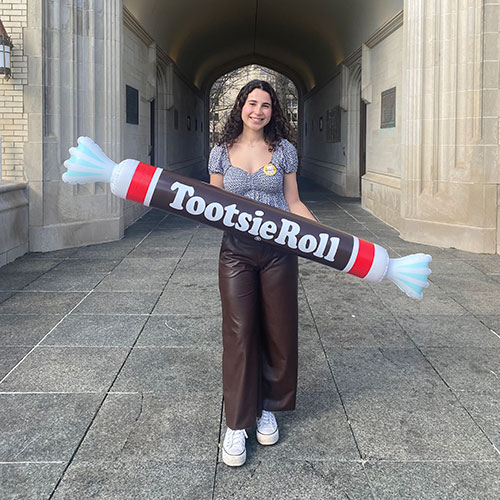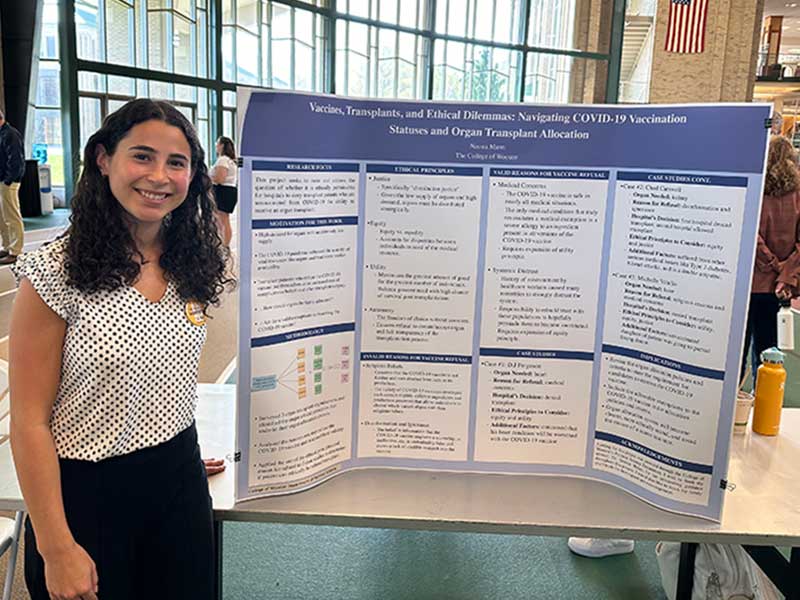
Political science major investigates the ethics of medical organ allocation

With a growing interest in bioethics, Naomi Mann ’24 designed a senior Independent Study to investigate the ethical principles and processes involved in medical organ allocation, especially in light of some patients’ refusal to receive the COVID-19 vaccine.
“I have not only learned important research methods and skills, but also gained a greater sense of who I am as a researcher and writer which instilled so much confidence in me and my work.”
—Naomi Mann ’24
Working with faculty mentor, Désirée Weber, associate professor and chair of political science, Mann, a minor in philosophy, asked important questions about what principles, such as equity and utility, are central to these health processes and decisions—and doing so especially with regard to the ongoing ripple effects of a global pandemic. She also considered patients’ reasons for refusing the vaccines and evaluated them for their relevance to the organ allocation process that all U.S. health institutions are bound by.
Q: What excites you about your I.S.?
Mann: My I.S. excites me because it allowed me a place to provide my unique voice and opinions on the complex issue of organ allocation which was pretty different from any other research or debate paper I wrote prior to I.S. I am super excited to continue to share my voice and contribute to the field of bioethics in hopes of helping to resolve many ethical issues in health care as I prepare to start graduate school this fall.
Q: How did Wooster prepare you for designing your project?
Mann: I was really interested in the legal and medical side of issues which we talked a lot about in my political science classes. I thought it’d be really cool to combine those two things. Junior I.S. definitely helped me start to develop a topic and design my project. Many of my classes focused on how to create an argument and defend it. We also talked a lot about theoretical ideas and made sure to apply those ideas to actual cases. I felt really prepared to do that in my project and make it more applicable to actual life.

Mann had the opportunity to present her research on bioethics at the 2024 Senior Research Symposium.
Q: In what ways has your relationship with your I.S. mentor supported you throughout this process?
Mann: The political science department really lets you take the wheel on what you want to do. My advisor Dr. Weber helped refine my topic to ensure that it was not too broad or too specific, and helped answer all my research questions. The success of my I.S. project would not have been possible without Dr. Weber’s knowledge and guidance!
Q: What has I.S. taught you?
Mann: The I.S. process has been invaluable in preparing me for graduate school and beyond. I have not only learned important research methods and skills, but also gained a greater sense of who I am as a researcher and writer which instilled so much confidence in me and my work.
In the fall Mann will be attending Johns Hopkins University pursuing a master’s in bioethics. “I hope to continue to understand and research the ethical issues related to organ allocation and transplantation,” she said. “This topic truly fascinates me, and I am extremely grateful to Wooster and the I.S. process for allowing me to realize this passion.
Posted in Independent Study on May 24, 2024.
Related Posts
Related Areas of Study
Pre-Health
Guidance on course selection, research opportunities and other planning for medical and dental school
Pre-Professional AdvisingPolitical Science
The study of power, with concentrations in U.S. politics, international relations, political theory and comparative politics.
Major MinorPhilosophy
Delve into ethical and moral debates while critically analyzing the issues facing humanity
Major Minor

